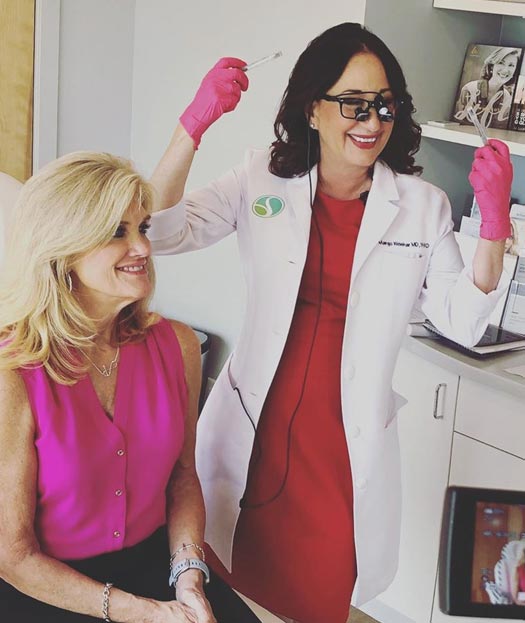Save the Date for our Annual Open House – The Springhouse Soiree! LEARN MORE
- About
- Cosmetic
- Conditions
- Injectables
- Lasers
- Skin Rejuvenation
- Signature Treatments
- Medical
- Gallery
- SHOP
- Contact us
- Book Now
We take an integrated, research-informed approach to treating hives and related skin conditions. Our practice is led by board-certified dermatologists Dr. Margo Weishar and Dr. Ashley Clark, who bring together decades of experience and a commitment to patient-centered care.
Dr. Weishar is internationally recognized for her expertise and has been voted one of Castle Connolly’s Top Doctors and Exceptional Women in Medicine. Dr. Clark adds an advanced academic and clinical research background, having authored more than 50 scientific publications and studied the skin’s immune response. Together, they offer unmatched diagnostic precision and treatment planning for patients throughout Bucks and Montgomery Counties.
Consulting with a board-certified dermatologist is essential to identifying the root cause of urticaria and creating an effective treatment strategy. At Springhouse Dermatology, our team focuses on understanding your skin’s triggers while helping you control symptoms and prevent recurrences.
Dr. Weishar and Dr. Clark work closely with each patient to build a plan based on the individual’s medical history, lifestyle, and unique presentation of hives. Treatment may include:
Creams containing menthol can provide temporary relief.
Some of these medications, like cetirizine and loratadine, may be available as over-the-counter medications while others may require a doctor’s prescription. Medications will be discussed during a consultation with Dr. Weishar at her Philadelphia office.
Medications such as prednisone can reduce inflammation when urticaria is severe, and a corticosteroid can assist in milder cases.
This auto-injector is used in situations where the allergic reaction becomes life-threatening.
Also known as phototherapy can help, can help with reducing inflammation and speeds the healing process – especially in patients who suffer from chronic hives.
Depending on the cause, your dermatologist may recommend certain diet and lifestyle changes to minimize allergies and prevent hives.
If you’re suffering from recurring or unexplained hives, it’s time to consult with trusted experts. At Springhouse Dermatology, our board-certified dermatologists bring together decades of combined experience in diagnosing and managing chronic skin conditions.
Whether the cause is an allergic reaction, environmental trigger, or underlying immune response, you’ll receive personalized, evidence-based care. Book your consultation today and take the first step toward long-term relief and clearer skin.

It is usually caused by an allergic reaction to something in your surrounding environment or something that you ate.
This skin reaction presents in many ways. On some people it appears as red, pink, or flesh-colored bumps or raised patches on the skin – some as small as a pinhead while others can stretch several inches across the body.
Ordinarily, hives last for 24-hours. However, in severe cases, the allergic reaction can cause angioedema, swelling deep in the skin, which can become life-threatening when it occurs inside the mouth or throat, resulting in breathing difficulties.
No, you cannot get hives from being around, or touching someone who has it. Even though some people may develop it when they have a contagious disease.
The allergic reaction usually dissipates after 24-hours and antihistamines can be helpful with alleviating the symptoms during this period.